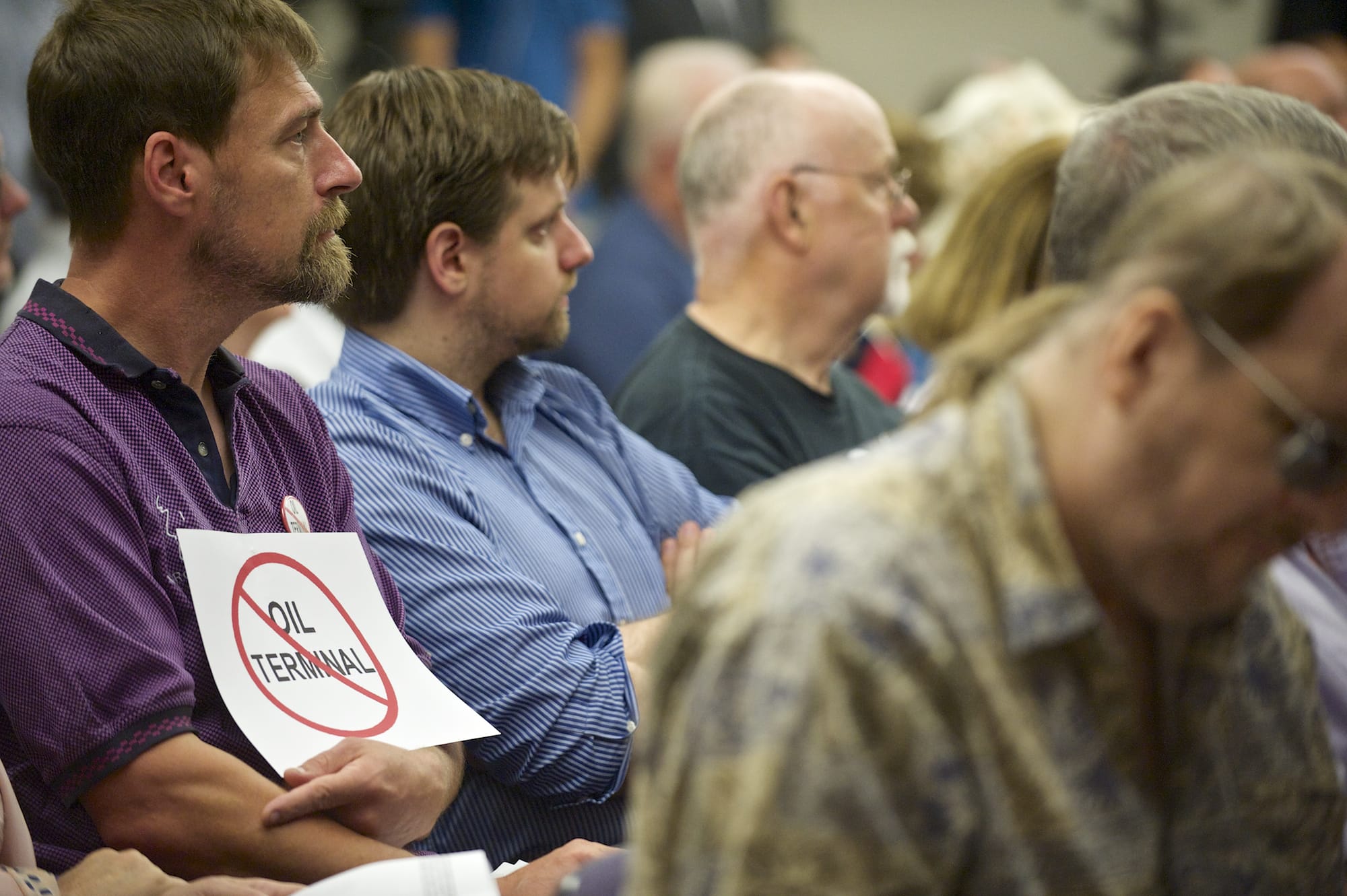Opponents of building the Northwest’s largest oil-by-rail terminal at the Port of Vancouver packed a hearing room Tuesday to keep up their criticism of port commissioners and to urge them to reconsider their lease decision.
This time, Vancouver business owners added their voices to those who disapprove of the oil terminal proposed by Tesoro Corp. and Savage Companies. Thirty-four business owners were listed as opponents in a press release issued to media. Twenty-five people, including business owners, made their concerns known to Commissioners Nancy Baker, Jerry Oliver and Brian Wolfe during the open forum portion of the commission’s regular public hearing.
And one opponent told commissioners that 73 Vancouver businesses have publicly stated their resistance to the oil terminal, while 10 Vancouver neighborhood associations have taken stands against it. During the port commission’s public hearing, opponents accused port commissioners of signing the lease too quickly and of failing to account for public safety. They urged them to cancel the agreement with Tesoro and Savage. And they said the oil terminal is a short-term development that will hamper long-term prosperity in Vancouver.
About 15 minutes before the port commission’s 9:30 a.m. hearing began, business owners gathered outside the port’s administrative building to show their opposition to the oil transfer terminal. They included Don Orange, owner of Hoesly Eco Automotive in Vancouver and chairman of the Main Street Alliance of Washington, a small-business advocacy group with more than 2,000 members. Addressing the oil terminal and Vancouver’s future, Orange said it’s “time not to turn this place into a toilet.” The comments by business owners and others who repudiate the oil terminal were the latest salvo against the project, as critics have maintained a presence at the port commission’s twice-monthly regular public meetings.
Port officials have given no indication they’re willing to re-open the lease for discussion. They’ve said the proposed oil transfer terminal will be subject to additional public scrutiny and input as it undergoes an environmental impact review by the Washington state Energy Facility Site Evaluation Council. Eventually, the evaluation council will make a recommendation to the governor, who will approve or deny the project. Opponents may appeal to the state Supreme Court.
Tesoro and Savage want to build an oil-by-rail terminal receiving an average of 360,000 barrels of crude per day at the port. The oil would be stored in six above-ground tanks. Each tank would have a shell capacity of 380,000 barrels for a total storage capacity of 2.28 million barrels. The oil would be loaded onto ships bound primarily for West Coast refineries.
‘Health risks’
The port’s lease with the companies, approved unanimously by commissioners in 2013, involves 42 acres and is worth at least $45 million over an initial 10 years.
Backers of the project say its benefits include new jobs, revenue for the port and increased U.S. energy independence. Critics cite many concerns, including potential oil spills, explosive oil train derailments and climate change.
During Tuesday’s public hearing, small-business owners questioned everything from the long-term viability of the oil terminal to the port’s interaction with the public. They also raised public safety concerns and said the oil terminal would diminish Vancouver’s capacity to become a destination point.
“Do you three want this to be your legacy?” Greg Ferguson, who’s practiced law in Vancouver for more than 20 years, asked port commissioners. “You have the power to change this.”
Ryan Palmer, who co-owns Torque Coffee in downtown Vancouver, said he has faith in the ability of the evaluation council and Gov. Inslee to correctly decide about the oil terminal. However, he said, the port mishandled the lease approval and continues to ignore citizens’ requests for more information and discussion.
Jakob Swan of Loowit Brewing Company told commissioners he’s worried about public safety, in light of the concerns over hauling crude oil by rail. He said his business is near railroad tracks and that he’s concerned about “physical harm to our customers.”
Meanwhile, the board of Vancouver’s Downtown Association, a nonprofit with 180 members, also has expressed concerns about the proposed oil terminal in two letters. One of them, sent in November 2013, went to the state evaluation council. The other letter, sent in January, went to Gov. Inslee.
In its letter to Inslee, the downtown association said that in the months since it sent its letter to the evaluation council, “our board has become more wary” of the proposed oil terminal.
“We are finding that the very ‘possibility’ of the project has cast a shadow over investment and projects in our downtown,” Lee Rafferty, executive director of the downtown association, wrote in the Jan. 24 letter. “And, we have learned that the health risks that we may suffer are very significant. This decision may negatively affect property values and investment in our city center for years to come.”
Asked about the board’s current position on the oil terminal, Rafferty noted Monday in an email to The Columbian the “strong concerns” the board outlined in its letters to the evaluation council and to the governor. She also said the board’s position is to “let the process work as it was designed” and to “let the scrutiny be applied at the highest level and with the full inspection under bright lights.”




